Human, Mouse, Rat, Hamster, Sheep, Rabbit, Cow, Canine, Pig, Monkey, Chicken, Xenopus laevis, Drosophila, Bacteria (-), Helminths (-), and (-) Anti-HSP60 Antibody Product Attributes
Species: Human, Mouse, Rat, Hamster, Sheep, Rabbit, Cow, Canine, Pig, Monkey, Chicken, Xenopus laevis, Drosophila, Bacteria (-), Helminths (-), and (-)
Tested Applications: Flow Cytometry, Immunofluorescence, Western Blot, Immunohistochemistry (IHC).
Application Notes: Flow Cytometry (0.5-1ug of antibody/million cells in 0.1ml), Immunofluorescence (0.5-1ug of antibody/ml), Western Blot (0.25-0.5ug of antibody/ml), Immunohistochemistry (IHC) (Formalin-fixed) (0.5-1ug of antibody/ml for 30 minutes at RT)
Clonality: Monoclonal
Anti-HSP60 Antibody Clone: SPM253
Clone SPM253 Host and Isotype: Mouse IgG1 kappa
Anti-Human, Mouse, Rat, Hamster, Sheep, Rabbit, Cow, Canine, Pig, Monkey, Chicken, Xenopus laevis, Drosophila, Bacteria (-), Helminths (-), and (-) HSP60 Positive Control Sample: HeLa or HepG2 cells. Synovial biopsies from patients with juvenile chronic arthritis. Synovial lining layer is strongly positive for hsp60. Breast carcinoma.
Cellular Localization of Antibody Mitochondria in cytoplasm
Buffer and Stabilizer: 10mM PBS with 0.05% BSA & 0.05% azide.
Antibody Concentration: 200ug/ml
Antibody Purification Method:Protein A/G Purified
Immunogen: Recombinant human HSP60 protein
Storage Conditions: Store at 2 to 8° C (refrigerate). Stable for 24 months when properly stored.
HSP60 Previously Observed Antibody Staining Patterns
Observed Subcellular, Organelle Specific Staining Data:
Anti-HSPD1 antibody staining is expected to be primarily localized to the mitochondria. There is variability in either the signal strength or the localization of signal in mitochondria from cell to cell.Observed Antibody Staining Data By Tissue Type:
Variations in HSP60 antibody staining intensity in immunohistochemistry on tissue sections are present across different anatomical locations. An intense signal was observed in cells in the tubules in kidney, glandular cells in the adrenal gland, duodenum, fallopian tube and rectum, hepatocytes in liver and respiratory epithelial cells in the bronchus. More moderate antibody staining intensity was present in cells in the tubules in kidney, glandular cells in the adrenal gland, duodenum, fallopian tube and rectum, hepatocytes in liver and respiratory epithelial cells in the bronchus. Low, but measureable presence of HSP60 could be seen inadipocytes in mesenchymal tissue, cells in the red pulp in spleen, cells in the seminiferous ducts in testis, cells in the white pulp in spleen, decidual cells in the placenta, fibroblasts in mesenchymal tissue, glandular cells in the breast, cervix, uterine and thyroid gland, glial cells in the caudate nucleus, cerebral cortex and hippocampus, islets of Langerhans in pancreas, Leydig cells in the testis, macrophages in lung, melanocytes in skin, myocytes in heart muscle, neuronal cells in the caudate nucleus, cerebral cortex and hippocampus, non-germinal center cells in the lymph node and tonsil, ovarian stroma cells in the ovary, peripheral nerve in mesenchymal tissue, Purkinje cells in the cerebellum, squamous epithelial cells in the oral mucosa and urothelial cells in the urinary bladder. We were unable to detect HSP60 in other tissues. Disease states, inflammation, and other physiological changes can have a substantial impact on antibody staining patterns. These measurements were all taken in tissues deemed normal or from patients without known disease.Observed Antibody Staining Data By Tissue Disease Status:
Tissues from cancer patients, for instance, have their own distinct pattern of HSP60 expression as measured by anti-HSP60 antibody immunohistochemical staining. The average level of expression by tumor is summarized in the table below. The variability row represents patient to patient variability in IHC staining.| Sample Type | breast cancer | carcinoid | cervical cancer | colorectal cancer | endometrial cancer | glioma | head and neck cancer | liver cancer | lung cancer | lymphoma | melanoma | ovarian cancer | pancreatic cancer | prostate cancer | renal cancer | skin cancer | stomach cancer | testicular cancer | thyroid cancer | urothelial cancer |
|---|---|---|---|---|---|---|---|---|---|---|---|---|---|---|---|---|---|---|---|---|
| Signal Intensity | +++ | +++ | ++ | +++ | +++ | ++ | +++ | +++ | +++ | ++ | +++ | ++ | +++ | +++ | +++ | ++ | +++ | +++ | +++ | +++ |
| HSPD1 Variability | + | + | ++ | + | + | ++ | + | + | + | ++ | ++ | ++ | ++ | + | + | ++ | ++ | + | ++ | ++ |
Limitations and Warranty
enQuire Bio's HSP60 Anti-Human Monoclonal is available for Research Use Only. This antibody is guaranteed to work for a period of two years when properly stored.

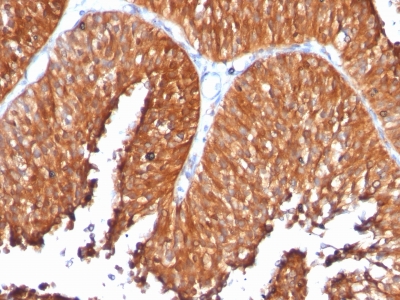


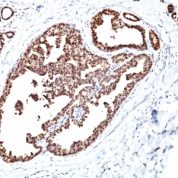
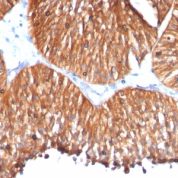
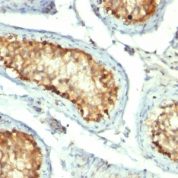
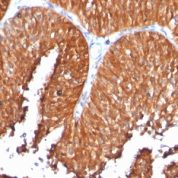
There are no reviews yet.